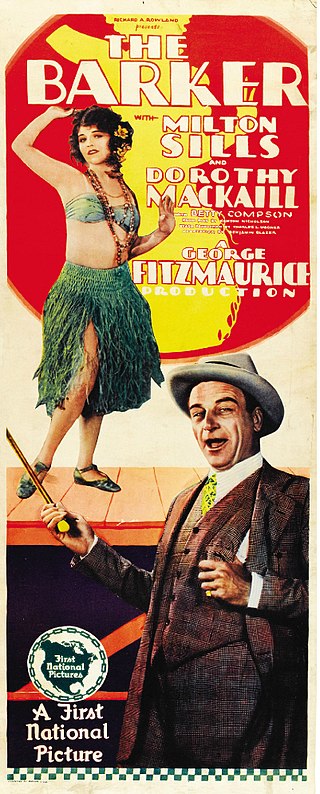
The Barker is a 1928 American part-talkie pre-Code romantic drama film produced and released by First National Pictures, a subsidiary of Warner Bros., acquired in September 1928. The film was directed by George Fitzmaurice and stars Milton Sills, Dorothy Mackaill, Betty Compson, and Douglas Fairbanks Jr. The Barker is a part-talkie with talking sequences and sequences with synchronized musical scoring and sound effects. The film was adapted by Benjamin Glazer, Joseph Jackson and Herman J. Mankiewicz from the play by Kenyon Nicholson.

Claude Farrère, pseudonym of Frédéric-Charles Bargone, was a French Navy officer and writer. Many of his novels are based in exotic locations such as Istanbul, Saigon, or Nagasaki.

Henry Byron Warner was an English film and theatre actor. He was popular during the silent era and played Jesus Christ in The King of Kings. In later years, he successfully moved into supporting roles and appeared in numerous films directed by Frank Capra. Warner's most recognizable role to modern audiences is Mr. Gower in It's a Wonderful Life, directed by Capra. He appeared in the original 1937 version of Lost Horizon as Chang, for which he was nominated for the Academy Award for Best Supporting Actor.

Robert Warwick was an American stage, film and television actor with over 200 film appearances. A matinee idol during the silent film era, he also prospered after the introduction of sound to cinema. As a young man he had studied opera singing in Paris and had a rich, resonant voice. At the age of 50, he developed as a highly regarded, aristocratic character actor and made numerous "talkies".
Norman Krasna was an American screenwriter, playwright, producer, and film director who penned screwball comedies centered on a case of mistaken identity. Krasna directed three films during a forty-year career in Hollywood. He garnered four Academy Award screenwriting nominations, winning once for 1943's Princess O'Rourke, which he also directed.

Montagu Love was an English screen, stage and vaudeville actor.

Tartuffe is a German silent film produced by Erich Pommer for UFA and released in 1926. It was directed by F. W. Murnau, photographed by Karl Freund and written by Carl Mayer from Molière's original play. It was shot at the Tempelhof Studios in Berlin. Set design and costumes were by Robert Herlth and Walter Röhrig.

The Treasure of the Sierra Madre is a 1948 American Western film written and directed by John Huston. It is an adaptation of B. Traven's 1927 novel of the same name, set in 1925, and follows two downtrodden men who join forces with a grizzled old prospector, in searching for gold in Mexico.
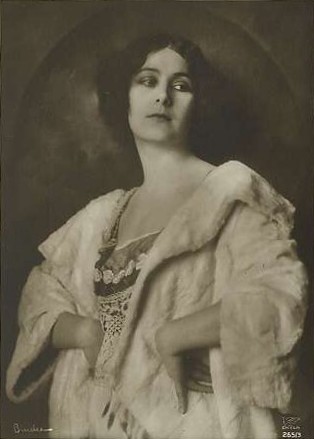
Lil Dagover was a German actress whose film career spanned between 1913 and 1979. She was one of the most popular and recognized film actresses in the Weimar Republic.

Olga Engl was an Austrian-German stage and motion picture actress who appeared in nearly 200 films.
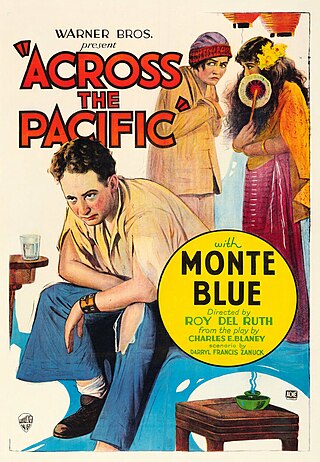
Across the Pacific is a 1926 American silent romantic adventure film produced by Warner Bros., directed by Roy del Ruth and starring Monte Blue. It was based on a 1900 play by Charles Blaney and J. J. McCloskey. The play had been filmed before in 1914 with Dorothy Dalton. It is unknown, but the film might have been released with a Vitaphone soundtrack.
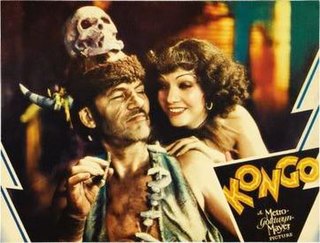
Kongo is a 1932 American pre-Code film directed by William J. Cowen and starring Walter Huston, Lupe Vélez, Conrad Nagel, and Virginia Bruce. It is an adaptation of the 1926 Broadway play of the same name that starred Huston as well. The film is also a remake of the 1928 silent film West of Zanzibar, which was based too on the 1926 play. That earlier film was directed by Tod Browning and stars Lon Chaney and Lionel Barrymore.

Night Watch is a 1928 American synchronized sound drama film directed by Alexander Korda and starring Billie Dove, Paul Lukas and Donald Reed. While the film has no audible dialog, it was released with a synchronized musical score with sound effects using the sound-on-disc Vitaphone process. The film was an adaptation of the dramatic 1921 play In the Night Watch, written by Michael Morton. The film is set almost entirely on a French warship at the beginning of the First World War. Night Watch was the first of Korda's films to feature sound.

Night Court is a 1932 American pre-Code crime film directed by W. S. Van Dyke and written by Bayard Veiller and Lenore Coffee. The film stars Phillips Holmes, Walter Huston, Anita Page, Lewis Stone and Mary Carlisle. The film was released June 4, 1932, by Metro-Goldwyn-Mayer.

Walter Walker was an American actor of the stage and screen during the first half of the twentieth century. Born in New York City on March 13, 1864, Walker would have a career in theater prior to entering the film industry. By 1915 he was appearing in Broadway productions, his first being Sinners, written by Pulitzer Prize-winning playwright, Owen Davis. His film debut was in a leading role in 1917's American – That's All. He had a lengthy career, in both film and on stage, appearing in numerous plays and over 80 films. Walker died on December 4, 1947, in Honolulu, Hawaii.
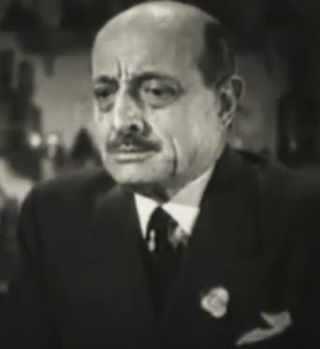
André Cheron was a French-born American character actor of the late silent and early sound film eras. During his 16-year career he appeared in over 100 films, usually in smaller roles, although with the occasional featured part.

Orient Express is a 1927 German silent thriller film directed by Wilhelm Thiele and starring Lil Dagover, Heinrich George and Angelo Ferrari. The film's sets were designed by the art directors Hans Baluschek and Karl Machus.
Harvey Francis Thew was a screenwriter in the United States. He worked mostly with Warner Bros. and wrote dozens of screenplays, often as part of a writing team. Some of his screenplays were adaptations. He also worked for MGM and Paramount. He was born in Vernon Center, Minnesota. He died in Los Angeles.
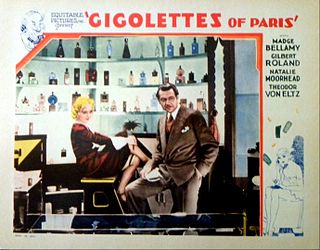
Gigolettes of Paris is a 1933 American movie written and directed by Alphonse Martell starring Madge Bellamy and Gilbert Roland featuring a A romance between a salesgirl, a wealthy count, and another man.

Veille d'armes is a 1935 French drama film directed by Marcel L'Herbier and starring Annabella and Victor Francen.


















